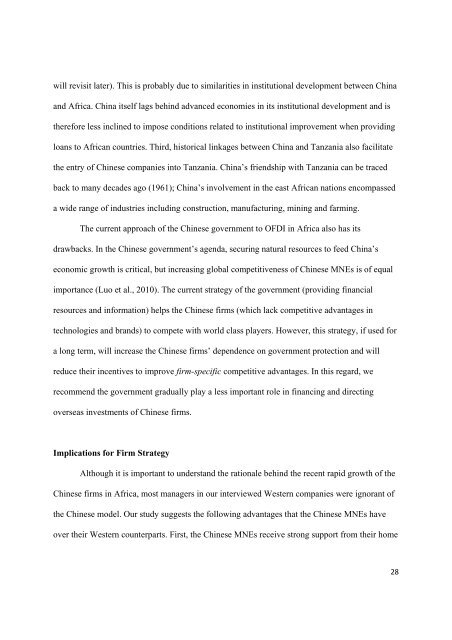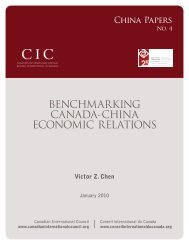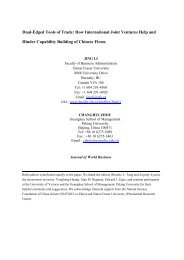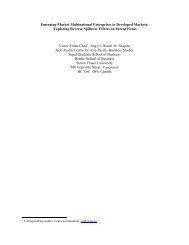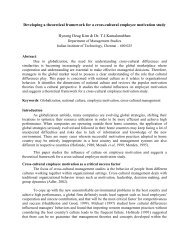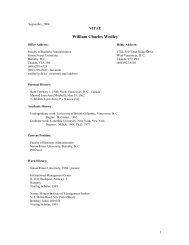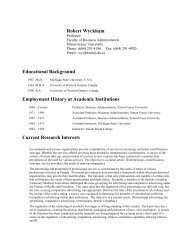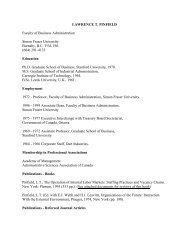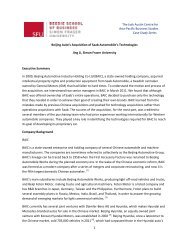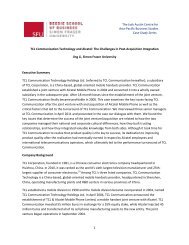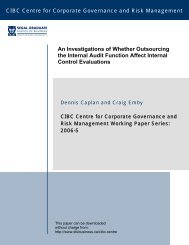Foreign Direct Investment in Natural Resource Industries in Africa ...
Foreign Direct Investment in Natural Resource Industries in Africa ...
Foreign Direct Investment in Natural Resource Industries in Africa ...
You also want an ePaper? Increase the reach of your titles
YUMPU automatically turns print PDFs into web optimized ePapers that Google loves.
will revisit later). This is probably due to similarities <strong>in</strong> <strong>in</strong>stitutional development between Ch<strong>in</strong>a<br />
and <strong>Africa</strong>. Ch<strong>in</strong>a itself lags beh<strong>in</strong>d advanced economies <strong>in</strong> its <strong>in</strong>stitutional development and is<br />
therefore less <strong>in</strong>cl<strong>in</strong>ed to impose conditions related to <strong>in</strong>stitutional improvement when provid<strong>in</strong>g<br />
loans to <strong>Africa</strong>n countries. Third, historical l<strong>in</strong>kages between Ch<strong>in</strong>a and Tanzania also facilitate<br />
the entry of Ch<strong>in</strong>ese companies <strong>in</strong>to Tanzania. Ch<strong>in</strong>a’s friendship with Tanzania can be traced<br />
back to many decades ago (1961); Ch<strong>in</strong>a’s <strong>in</strong>volvement <strong>in</strong> the east <strong>Africa</strong>n nations encompassed<br />
a wide range of <strong>in</strong>dustries <strong>in</strong>clud<strong>in</strong>g construction, manufactur<strong>in</strong>g, m<strong>in</strong><strong>in</strong>g and farm<strong>in</strong>g.<br />
The current approach of the Ch<strong>in</strong>ese government to OFDI <strong>in</strong> <strong>Africa</strong> also has its<br />
drawbacks. In the Ch<strong>in</strong>ese government’s agenda, secur<strong>in</strong>g natural resources to feed Ch<strong>in</strong>a’s<br />
economic growth is critical, but <strong>in</strong>creas<strong>in</strong>g global competitiveness of Ch<strong>in</strong>ese MNEs is of equal<br />
importance (Luo et al., 2010). The current strategy of the government (provid<strong>in</strong>g f<strong>in</strong>ancial<br />
resources and <strong>in</strong>formation) helps the Ch<strong>in</strong>ese firms (which lack competitive advantages <strong>in</strong><br />
technologies and brands) to compete with world class players. However, this strategy, if used for<br />
a long term, will <strong>in</strong>crease the Ch<strong>in</strong>ese firms’ dependence on government protection and will<br />
reduce their <strong>in</strong>centives to improve firm-specific competitive advantages. In this regard, we<br />
recommend the government gradually play a less important role <strong>in</strong> f<strong>in</strong>anc<strong>in</strong>g and direct<strong>in</strong>g<br />
overseas <strong>in</strong>vestments of Ch<strong>in</strong>ese firms.<br />
Implications for Firm Strategy<br />
Although it is important to understand the rationale beh<strong>in</strong>d the recent rapid growth of the<br />
Ch<strong>in</strong>ese firms <strong>in</strong> <strong>Africa</strong>, most managers <strong>in</strong> our <strong>in</strong>terviewed Western companies were ignorant of<br />
the Ch<strong>in</strong>ese model. Our study suggests the follow<strong>in</strong>g advantages that the Ch<strong>in</strong>ese MNEs have<br />
over their Western counterparts. First, the Ch<strong>in</strong>ese MNEs receive strong support from their home<br />
28


